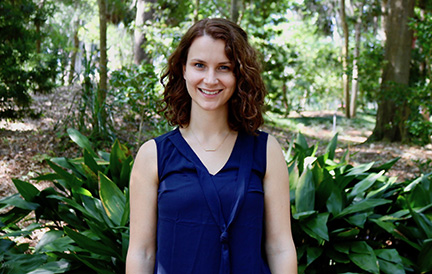When Liselotte de Wit was in high school in the Netherlands, she worked at a facility for patients who had severe dementia. Her time taking care of these patients had a profound effect on her education and career goals.
“Witnessing the patients and their family members sparked an urge to lessen their mental suffering at a very young age,” she said. “Ever since, my goal was to get the best education to understand the mechanisms causing this burden and help develop and improve treatments.”
Inspired to pursue a career in neuropsychology, de Wit was drawn to the scientist-practitioner model at UF’s department of clinical and health psychology. As a student in the department’s doctoral program, she receives both clinical and research-based training while working with patients who have mild cognitive impairment, or MCI, and dementia.
De Wit’s mentor, Glenn Smith, Ph.D., a professor and chair in the department of clinical and health psychology, is an international MCI and dementia expert who directs a research trial geared toward preventing and delaying the onset of dementia. The trial uses several different methods for treating mild cognitive impairment and is called Healthy Action to Benefit Independence and Thinking, or HABIT. Patients with MCI and a partner or spouse participate in memory compensation training, yoga, brain fitness, support groups and wellness education over 10 days.
Smith is currently researching HABIT’s effectiveness by measuring the brain changes associated with behavior interventions using magnetic resonance imaging in a study called Physical Exercise and Cognitive Engagement Outcomes for Mild Neurocognitive Disorder, or PEACEOFMND. The evolution of this research project allowed de Wit to successfully compete for a $77,000 grant from Alzheimer Nederland. Her project is an add-on to the PEACEOFMND study. Together with memory disorders expert Roy Kessels, Ph.D., at Radboud University of Nijmegen in the Netherlands, de Wit and Smith will work together to investigate the implications of implicit memory for memory compensation training.
“Being able to help people is my favorite part,” de Wit said. “All the participants that I have worked with for the PEACEOFMND project are appreciative that someone is trying to develop a program. Working as a clinical neuropsychology trainee, I get the face-to-face time with my patients, and we get to work through things together.”
De Wit values her international training and hopes to become a licensed neuropsychologist in the United States and the Netherlands, bringing together the knowledge of clinical care and research in both countries.

